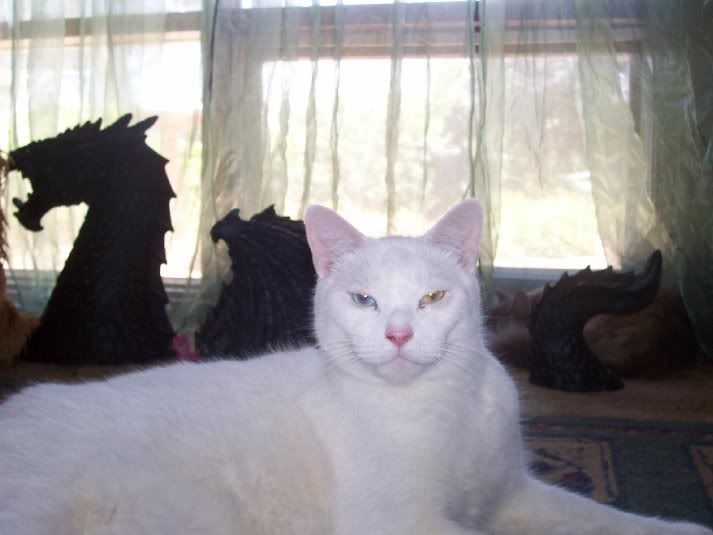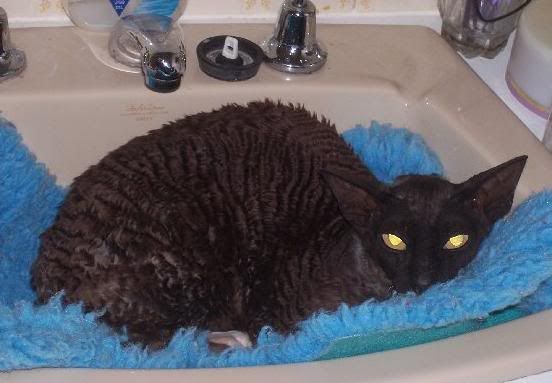Imposters and Kitten Pics + EDIT
I was surfing last night and stumbled across a term I had never heard of before, 'Imposter Syndrome'. Curious, I read about it and was stunned.
I remember clearly a time early in my second year of university studies when I had been struck by this syndrome, although at the time I had no clue what it was that was affecting me. I had finished my TAFE (college) studies on a 99% High Distinction. I had sat the University Entrance exam and scored the highest rank in the state of South Australia. I had been accepted into an elite Psychology Program that only took in 25 people per year. In my first year my grades were in the top 15% of the entire university (not just my program or campus). I had made the Dean's Merit List and been invited to join the Golden Key International Honour Society for Academic High Achievers.
I was at the Golden Key induction ceremony when I had my Imposter Syndrome moment. The keynote speaker was indicating the students to the audience, declaring that these people were the people who would shape the world of tomorrow.
It was like waking from a dream. Suddenly I looked around me and thought, 'What the heck am I doing here? I don't deserve to be here? I'm nothing but a housewife' What the hell was I thinking?'
And from that moment on I began to sabotage my studies so I lived up to my belief that, despite all my achievements, I was an Imposter.
When I found this article, it explained it all.
Imposter syndrome can be defined as a collection of feelings of inadequacy that persist even in face of information that indicates that the opposite is true. It is experienced internally as chronic self-doubt, and feelings of intellectual fraudulence.
It is basically feeling that you are not really a successful, competent, and smart student, that you are only imposing as such.
Some common feelings and thoughts that might characterize the imposter syndrome are: “I feel like a fake” “My classmates/professors/ workmates etc. are going to find out I don’t really belong here.”
· The imposter feelings can be divided into three sub categories:
Feeling like a fake: the belief that one does not deserve his or her success or professional position and that somehow other have been deceived into thinking otherwise. This goes together with a fear of being, “found out”, discovered or “unmasked”. People who feel this way would identify with statements such as: “I can give the impression that I am more competent than I really am.” “I am often afraid that others will discover how much knowledge I really lack”.
Attributing success to luck: Another aspect of the imposter syndrome is the tendency to attribute success to luck or to other external reasons and not to your own internal abilities. Someone with such feeling would refer to an achievement by saying, “I just got lucky this time” “it was a fluke” and with fear that they will not be able to succeed the next time. [This used to be me to a T. I always apologised for doing well, as though my success somehow was discourteous to others who did not do so well]
Discounting Success: The third aspect is a tendency to downplay success and discount it. One with such feelings would discount an achievement by saying, “it is not a big deal,” “it was not important.” One example of this is discounting the fact that they made it here, which is really a big success. Or saying, “I did well because it is an easy class etc.” Having a hard time accepting compliments. ['Oh, it is easy for me, so it doesn't count.'How many times have I said that and minimised what I have achieved?]
This is not an all or nothing syndrome. Most of you probably could identify with a few statements but not with others. Some people may identify with imposter feelings in some situations and not in others, or maybe you may not identify with these feelings but have friends who do.
Who is likely to have the imposter syndrome?
The imposter syndrome is associated with highly achieving, highly successful people. This makes imposter feelings somewhat different from the concept of “low self-esteem” because there is a discrepancy between the actual achievement and the person’s feelings about the achievement that may not be present in low self-esteem. People in different professions such as teachers, people in the social sciences, people in academia, actresses and actors, may all have imposter feelings. It was originally associated with women but recent research indicated that men suffer in similar numbers.
Attitudes, beliefs, direct or indirect messages that we received from our parents or from other significant people in our lives early on may have contributed to the development of imposter feelings. Certain family situations and dynamics tend to contribute to imposter feelings: when the success and career aspirations conflicts with the family expectations of the gender, race, religion, or age of the person, families who impose unrealistic standards, families who are very critical, and families who are ridden with conflict and anger.
Some researchers identify two main types of family dynamics that can contribute to imposter feelings, although there may be others.
Family Labels: Different children in a family may be identified or labeled differently. For example, some families have one “intelligent” child and one “sensitive” child. While growing up, many times families will not change their perception of each child, no matter what that child does. Therefore, the sensitive child, even if she gets better grades or more awards may not be recognized for her intelligence. This can lead to doubting her intelligence and believing the family is correct even with evidence, which contradicts these labels.
Family messages of superiority: Other families can give their child full support to the point where the family and girl believe that she is superior or perfect. As the girl grows up and encounters challenging tasks, she may begin to doubt her parent’s perceptions and may also need to hide her difficulties in order not to disturb the family image of her. As a result of these normal difficulties, this girl may come to believe that she is only average and even below average.
The connection between imposter feelings and success:
Imposter feelings relate to an inability to internalize past and current success.[YES!!!! I can SO relate to this!!] Being successful does not alter how you feel about yourself and does not alleviate feelings of inadequacy.
Fear of Success: Also, people with imposter feelings can have a tendency to over internalize failure. People who feel like imposters may fear success and the responsibility and visibility that come with it. [Oh god yes!! Me, me, me!!] Since being more successful will increase the tension between the inner feelings and the outside perceptions.
Pressure not to fail: There can be a huge amount of pressure currently not to fail to avoid being “found out.” This leads to not being able to enjoy/internalize success.
Overcoming Imposter Feelings
Behaviors and Beliefs that perpetuate imposter feelings:
Diligence: Gifted women often work hard in order to prevent people from discovering that she is an “imposter”. This hard work often leads to more praise and success, which perpetuates the imposter feelings and fears of being “found out.”
Feeling of being phony: A woman with imposter feelings often attempt to give supervisors and professors the answers that she believes they want, which often leads to an increase in feeling like she is “being a fake”
Use of charm: Connected to this, gifted women often use their intuitive perceptiveness and charm to gain approval and praise from supervisors and seek out relationships with supervisors in order to help her increase her abilities intellectually and creatively. However, when the supervisor gives her praise or recognition, she feels that this praise is based on her charm and not on ability.
Avoiding display of confidence: Another way that a woman can perpetuate her imposter feelings is to avoid showing any confidence in her abilities. A women dealing with imposter feelings may believe that if she actually believes in her intelligence and abilities she may be rejected by others. Therefore, she may convince herself that she is not intelligence or does not deserve success to avoid this.
(http://www.counseling.caltech.edu/articles/The%20Imposter%20Syndrome.htm)
This article explained so much to me and why I self-sabotaged back then.
Now I think about my recent success in Nanowrimo and I smile because this time I did not apologise for having time to write, or excuse the fact I had done well. This time I even said I was a little proud of myself. While the Imposter Syndrome struck with a vengence back in University days, I think I'm getting a handle on it now. I hope so.
Perhaps in sharing this article, others who are plagued by the same problem may now begin to understand what it is they are dealing with.
And now.... just for some fun:
Bella - my latest taming project is coming along very well

Floyd proving he's not afraid of Dragons

Kool Kitten

Seeing double..or is that triple? Serenity, Masked Lady and Moose, the three bluepoints

Nacho has a BIG nose - and is very proud of it!

Oh, and I nearly forgot!! We have a new cat!

She's a Devon Rex. She's supposed to be black and white but is more brown and white and is totally gorgeous! And, was free! A breeder a friend knows is going out of business and getting rid of all her breeding stock.
Ok, there you have it. Some food for thought and food for smiles....:)

Red.
I remember clearly a time early in my second year of university studies when I had been struck by this syndrome, although at the time I had no clue what it was that was affecting me. I had finished my TAFE (college) studies on a 99% High Distinction. I had sat the University Entrance exam and scored the highest rank in the state of South Australia. I had been accepted into an elite Psychology Program that only took in 25 people per year. In my first year my grades were in the top 15% of the entire university (not just my program or campus). I had made the Dean's Merit List and been invited to join the Golden Key International Honour Society for Academic High Achievers.
I was at the Golden Key induction ceremony when I had my Imposter Syndrome moment. The keynote speaker was indicating the students to the audience, declaring that these people were the people who would shape the world of tomorrow.
It was like waking from a dream. Suddenly I looked around me and thought, 'What the heck am I doing here? I don't deserve to be here? I'm nothing but a housewife' What the hell was I thinking?'
And from that moment on I began to sabotage my studies so I lived up to my belief that, despite all my achievements, I was an Imposter.
When I found this article, it explained it all.
Imposter syndrome can be defined as a collection of feelings of inadequacy that persist even in face of information that indicates that the opposite is true. It is experienced internally as chronic self-doubt, and feelings of intellectual fraudulence.
It is basically feeling that you are not really a successful, competent, and smart student, that you are only imposing as such.
Some common feelings and thoughts that might characterize the imposter syndrome are: “I feel like a fake” “My classmates/professors/ workmates etc. are going to find out I don’t really belong here.”
· The imposter feelings can be divided into three sub categories:
Feeling like a fake: the belief that one does not deserve his or her success or professional position and that somehow other have been deceived into thinking otherwise. This goes together with a fear of being, “found out”, discovered or “unmasked”. People who feel this way would identify with statements such as: “I can give the impression that I am more competent than I really am.” “I am often afraid that others will discover how much knowledge I really lack”.
Attributing success to luck: Another aspect of the imposter syndrome is the tendency to attribute success to luck or to other external reasons and not to your own internal abilities. Someone with such feeling would refer to an achievement by saying, “I just got lucky this time” “it was a fluke” and with fear that they will not be able to succeed the next time. [This used to be me to a T. I always apologised for doing well, as though my success somehow was discourteous to others who did not do so well]
Discounting Success: The third aspect is a tendency to downplay success and discount it. One with such feelings would discount an achievement by saying, “it is not a big deal,” “it was not important.” One example of this is discounting the fact that they made it here, which is really a big success. Or saying, “I did well because it is an easy class etc.” Having a hard time accepting compliments. ['Oh, it is easy for me, so it doesn't count.'How many times have I said that and minimised what I have achieved?]
This is not an all or nothing syndrome. Most of you probably could identify with a few statements but not with others. Some people may identify with imposter feelings in some situations and not in others, or maybe you may not identify with these feelings but have friends who do.
Who is likely to have the imposter syndrome?
The imposter syndrome is associated with highly achieving, highly successful people. This makes imposter feelings somewhat different from the concept of “low self-esteem” because there is a discrepancy between the actual achievement and the person’s feelings about the achievement that may not be present in low self-esteem. People in different professions such as teachers, people in the social sciences, people in academia, actresses and actors, may all have imposter feelings. It was originally associated with women but recent research indicated that men suffer in similar numbers.
Attitudes, beliefs, direct or indirect messages that we received from our parents or from other significant people in our lives early on may have contributed to the development of imposter feelings. Certain family situations and dynamics tend to contribute to imposter feelings: when the success and career aspirations conflicts with the family expectations of the gender, race, religion, or age of the person, families who impose unrealistic standards, families who are very critical, and families who are ridden with conflict and anger.
Some researchers identify two main types of family dynamics that can contribute to imposter feelings, although there may be others.
Family Labels: Different children in a family may be identified or labeled differently. For example, some families have one “intelligent” child and one “sensitive” child. While growing up, many times families will not change their perception of each child, no matter what that child does. Therefore, the sensitive child, even if she gets better grades or more awards may not be recognized for her intelligence. This can lead to doubting her intelligence and believing the family is correct even with evidence, which contradicts these labels.
Family messages of superiority: Other families can give their child full support to the point where the family and girl believe that she is superior or perfect. As the girl grows up and encounters challenging tasks, she may begin to doubt her parent’s perceptions and may also need to hide her difficulties in order not to disturb the family image of her. As a result of these normal difficulties, this girl may come to believe that she is only average and even below average.
The connection between imposter feelings and success:
Imposter feelings relate to an inability to internalize past and current success.[YES!!!! I can SO relate to this!!] Being successful does not alter how you feel about yourself and does not alleviate feelings of inadequacy.
Fear of Success: Also, people with imposter feelings can have a tendency to over internalize failure. People who feel like imposters may fear success and the responsibility and visibility that come with it. [Oh god yes!! Me, me, me!!] Since being more successful will increase the tension between the inner feelings and the outside perceptions.
Pressure not to fail: There can be a huge amount of pressure currently not to fail to avoid being “found out.” This leads to not being able to enjoy/internalize success.
Overcoming Imposter Feelings
Behaviors and Beliefs that perpetuate imposter feelings:
Diligence: Gifted women often work hard in order to prevent people from discovering that she is an “imposter”. This hard work often leads to more praise and success, which perpetuates the imposter feelings and fears of being “found out.”
Feeling of being phony: A woman with imposter feelings often attempt to give supervisors and professors the answers that she believes they want, which often leads to an increase in feeling like she is “being a fake”
Use of charm: Connected to this, gifted women often use their intuitive perceptiveness and charm to gain approval and praise from supervisors and seek out relationships with supervisors in order to help her increase her abilities intellectually and creatively. However, when the supervisor gives her praise or recognition, she feels that this praise is based on her charm and not on ability.
Avoiding display of confidence: Another way that a woman can perpetuate her imposter feelings is to avoid showing any confidence in her abilities. A women dealing with imposter feelings may believe that if she actually believes in her intelligence and abilities she may be rejected by others. Therefore, she may convince herself that she is not intelligence or does not deserve success to avoid this.
(http://www.counseling.caltech.edu/articles/The%20Imposter%20Syndrome.htm)
This article explained so much to me and why I self-sabotaged back then.
Now I think about my recent success in Nanowrimo and I smile because this time I did not apologise for having time to write, or excuse the fact I had done well. This time I even said I was a little proud of myself. While the Imposter Syndrome struck with a vengence back in University days, I think I'm getting a handle on it now. I hope so.
Perhaps in sharing this article, others who are plagued by the same problem may now begin to understand what it is they are dealing with.
And now.... just for some fun:
Bella - my latest taming project is coming along very well

Floyd proving he's not afraid of Dragons

Kool Kitten

Seeing double..or is that triple? Serenity, Masked Lady and Moose, the three bluepoints

Nacho has a BIG nose - and is very proud of it!

Oh, and I nearly forgot!! We have a new cat!

She's a Devon Rex. She's supposed to be black and white but is more brown and white and is totally gorgeous! And, was free! A breeder a friend knows is going out of business and getting rid of all her breeding stock.
Ok, there you have it. Some food for thought and food for smiles....:)

Red.